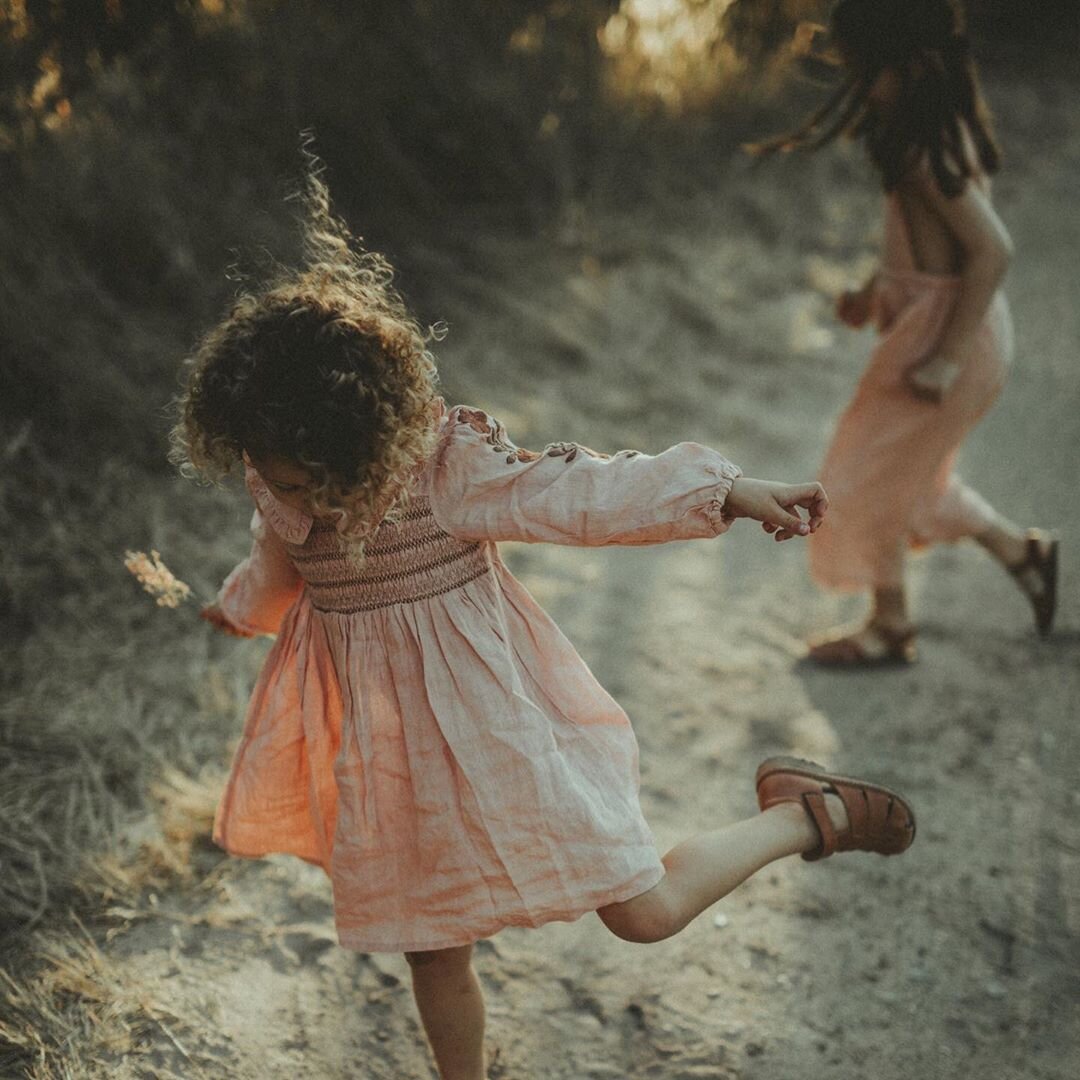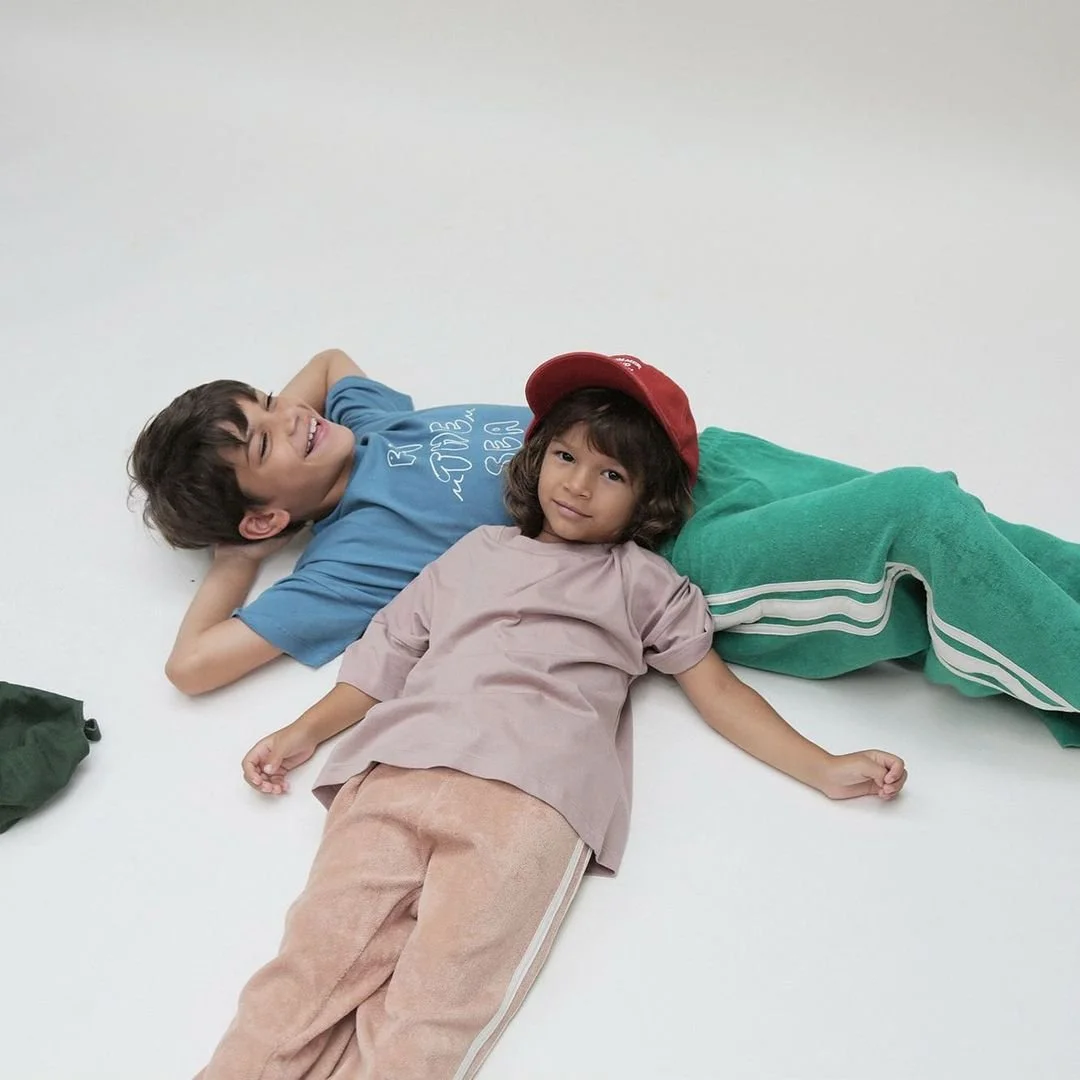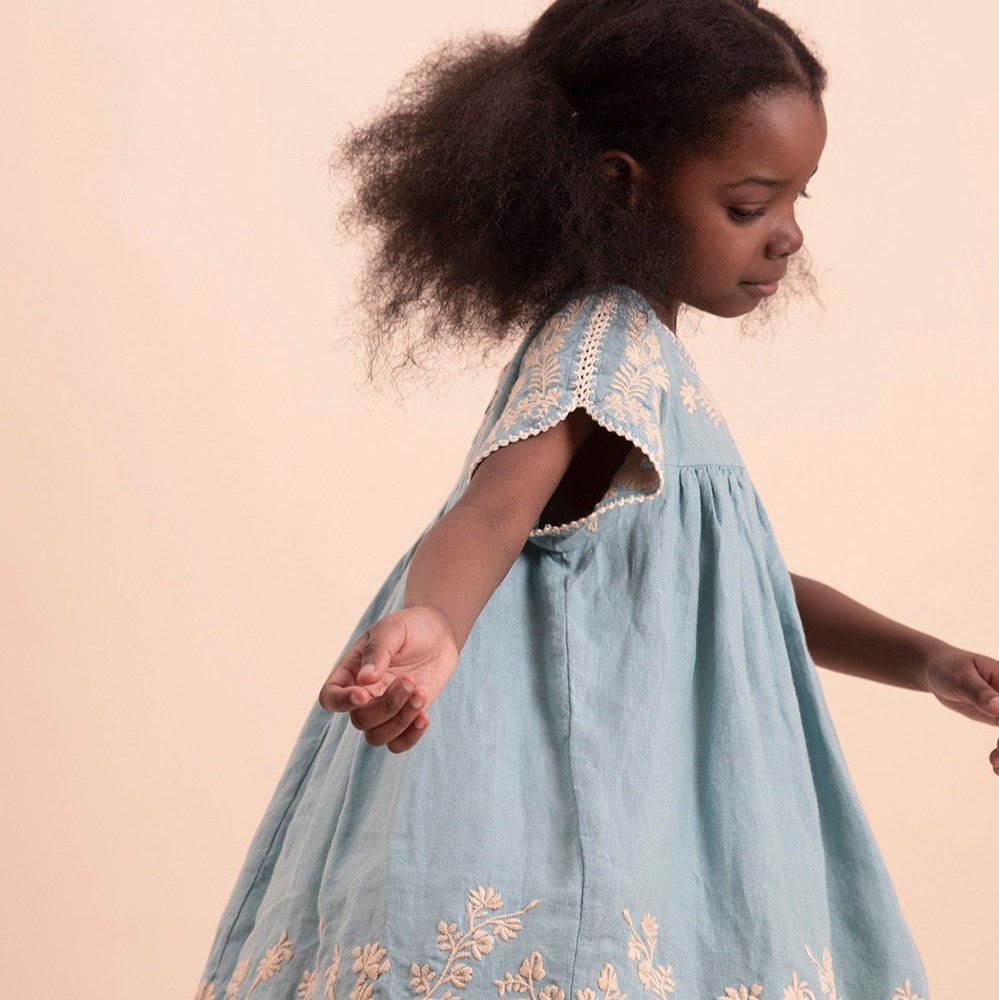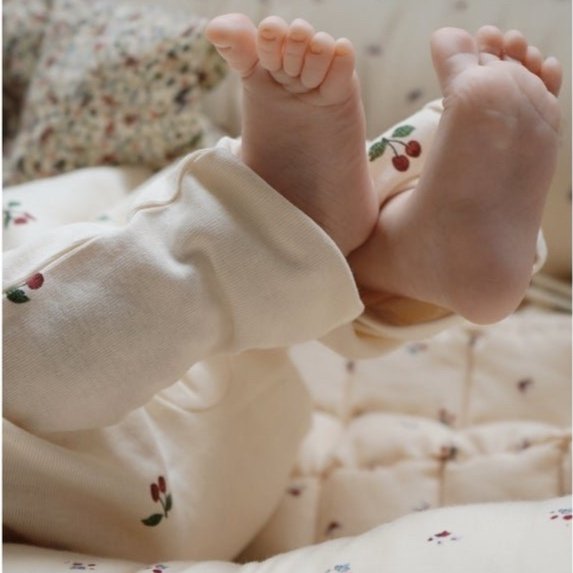Up Close with Caroline Duckett, Founder and Designer of Apolina
Photos by Apolina
Apolina was love at first sight for me. And what’s not to love; the boho vibes, perfect colors, the details and it’s ethically produced. Yes, please. I first heard of Apolina through a Mama friend of mine and when I went online the week after that season’s launch, it had already sold out. The next season I thought I’d do better, but naively waited until too late in the day and almost everything was gone. It was my first introduction to a kid’s brand with a seriously loyal following. It makes sense, each item is unique due to the hand finishing and styles are produced in limited numbers through ‘small batch’ production.
I finally got it together for AW19 and made sure one of my favorite kid’s stores, Cloth, would be carrying my preferred styles. I messaged the owner, Justine, ahead, to ask if I could pre-order and she politely explained I was 1 of 100 that had made the same request. But I was ready and finally, Apolina was on it’s way to me. What I wasn’t prepared for was the exceptional quality. The material weight and feel, the embroidery and the finishing, quality you often don’t often see in even the most high-end women’s brands.
Apolina
Apolina entered the market at the end of 2016 and according to the founder, Caroline Duckett, it’s purposely made with a looser fit and the easy ability to be layered up and down depending on weather, for maximum wear. Caroline told me, “We mindfully design our pieces to last multiple seasons. We do not follow fashion 'trends', aiming to make our pieces suitable to be passed down through generations.”
She manages to somehow find a perfect balance of beautiful vintage design and durable materials and construction. Meer Guide had a chance to interview Caroline about Apolina, her company’s many efforts in sustainability and even some of her own favorite things for herself.
Apolina moodboard
ANYTHING YOU WANT TO SHARE ABOUT THE ETHOS OF YOUR COMPANY?
I started Apolina as a celebration of craft. In my previous life (pre-children!) I’d worked a lot with bigger Indian manufacturers and had always been unable to afford the kind of handwork that I loved due to tight retail margins!
I had a friend I'd made in London whilst he was studying fashion, his dad owned a factory just outside of Delhi and when he'd finished studying he decided to go and work in the family business. I knew the small set up there was perfect for Apolina. I went to visit and discuss and just loved what I saw.
Apolina is about creating special pieces for everyday, mindfully designing garments to ensure that wear time is maximised that will be treasured and passed down and supporting traditional skills.
PLEASE TELL US ABOUT WHERE YOU’RE LOCATED AND YOUR TEAM.
I'm located an hour north of London, we made the move out here partly to allow our children a more rural upbringing and partly because I needed to expand my small studio and couldn't face the idea of renting a separate studio in London! We have a separate studio building which sits beside our 16th century cottage in our small country village. It's a pretty idyllic situation compared to the early days of working in my back bedroom in London ;)
I have a small team. In the studio it's just myself and my partner Martin (who takes care of the website and graphic design) and then I have our merchandiser Amy, who works part-time on the planning and numbers side. We also have Tarn, who is based in Scotland and works on our newsletter and helps with copywriting.
Our warehouse and packing is separate, this is based up in the north of England (where I'm originally from and the rest of my family lives!). I visit often and am in regular contact of course with Kirsty, who manages Apolina shipping.
The rest of the team is in India. I have Prachi and Arif who handle the day to day running of things that side. I am usually in daily contact with them via emails, whatsapp and calling.
Caroline and Sheela in the sampling room
WHERE ARE THE COLLECTIONS PRODUCED? ARE YOU ABLE TO CLOSELY MONITOR YOUR PRODUCTION?
Collections are produced in India, just outside of Delhi in our small family run factory. I visit at least twice a year to see production of the main collections. I am also in almost constant communication wth them during production.
WHAT WAS YOUR PROCESS IN SELECTING YOUR FACTORIES ANDHOW DO YOU ENSURE YOUR MANUFACTURERS ARE MEETING BEST ETHICAL PRACTICES ONGOING?
One of the 3 owners is a personal friend of mine for over 10 years. The other 2 owners are his father and his wife. I know all of them extremely well. I have visited many times and personally observed the conditions, safety notices, fire exits, workforce, working conditions and am extremely confident that my factory care just as much as I do about workers rights and safety. The factory is C-TPAT compliant and Sedex approved.
Scenes from the factory during Apolina production
WHAT KIND OF FABRICS DO YOU MOST USE?
Toward the end of last year I did a lot of research about fabrics and set my goals for our next collections in development (AW20 onwards, as we work 1 year ahead on our collections). My mission is to reduce our use of standard cotton and increase our use of linen. Linen is a much kinder crop for our planet. It's a much less thirsty crop and is happy to grow on a wide variety of soil types. We are also increasing our use of yarn dyed fabrics and khadi cloths which are woven by traditional methods using traditional artisan skills. These are woven by small communities and buying these cloths directly, which we do, helps to support these communities.
HOW DO YOU SELECT THE FABRICS YOU USE AND WHERE DO THEY COME FROM?
I have running qualities I'm happy with for our linen, we have started to buy greige undyed cloth in linen which we can batch dye as and when we need, to ensure we aren't left with excess. For our yarn dye checks/ stripes I usually spend time sourcing when I am in India. Last trip I went to an amazing craft fair with workers from all over India showing their wares, this enabled us to find some fantastic artisan weavers who are developing new fabrics to our design for future seasons.
CAN YOU PLEASE TELL US A LITTLE ABOUT HOW YOUR FABRICS ARE DYED?
We ensure the dye mills we work with have business practises that are environmentally and ethically responsible, we use products with certification focussing on responsible water, chemical and energy footprints for our brand.
All our dyes are non-toxic, azo-free and we do not use any heavy metals in the processing of our fabrics. The bulk cloth is tested both in India and then receives secondary testing in the UK, to ensure that we are confident that they comply with EU standards.
WHAT DO YOU DO WITH YOUR OVERSTOCK OF MATERIALS AND FABRIC SCRAPS?
We generally, do not have overstock. As all my production goes through one factory it's easy to use up the extras when we have them by making a couple of extra garments vs my order quantity. We always discuss what’s leftover at the end of production and I choose what to make extras of. Larger scraps are collected and we have introduced smaller accessories into our range such as our purses and headscarves.
CAN YOU PLEASE TELL US ABOUT YOUR PACKAGING FOR SHIPMENTS TO CUSTOMERS?
We use recycled craft tissue paper and kraft mailers that are environmentally friendly, renewable and able to be recycled multiple times.
Our protection bags used for wholesale and keeping items clean in our own warehouse are degrable. We sourced these last year and have had them for the past 2 seasons. They degrade to water over time and leave no micro plastics.
DO YOU USE RECYCLED PAPER FOR YOUR HANG TAGS, POSTCARDS AND LOOKBOOKS?
Our hang tags and postcards are recycled paper.
Apolina hand smocking
DO YOU WANT TO SHARE ANYTHING ELSE WITH OUR READERS?
We are particularly passionate about utilising traditional Indian crafts and keeping these skills alive and supporting the traditional craft industry. We use hand finishing such as blanket stitch and crochet trims as well as hand smocking and larger panels of hand crochet. Personally for me seeing the aunties sitting around chatting and sewing by hand is always a highlight when I visit the factory. Their skill is incredible, they work so quickly and it's mesmerising to watch them. I know these ladies well after years of visiting, and usually manage to persuade them to stand with me for a photo even though they are generally pretty camera shy!
IF SOMEONE IS NEW TO SUSTAINABILITY, WHAT CHANGE(S) CAN THEY BEGIN IMMEDIATELY TO MAKE A DIFFERENCE?
Question the cost of the piece your buying. Could the worker have been paid fairly for it? Look into the company. Support small makers.
Caroline and her daughters, Photo by Lisa Sorgini
How would you describe your personal style?
I'd describe it as California style trapped in a rainy english landscape :) Generally I have quite a simple, unfussy style I'd say.
What are your favorite clothing/accessory brands to shop for yourself?
Nowadays I buy for myself very infrequently. Since I hit my thirties I am happy to have found a more consistent sense of my own style. Last year I treated myself to a Misha & Puff womens jumper and it's just the best thing ever. I wear it embarrassingly often. I have 2 pairs of Annie Costello Brown earrings which are pretty much the only jewellery pieces I own as I am pretty anti accessories. Until very recently I didn't have a handbag as I find them too ladylike, and went around with my credit cards in my pocket or an old bumbag (fannypack) I’d had since my teens. I love Doen for blouses, Rudy Jude for loungewear and favour vintage Levi jeans. I wear Birkenstocks pretty much year round, especially now they brought out cosy clogs.
What are your 3 wardrobe essentials you couldn't live without?
*Blue Annie Costello Brown 'pom pom' earrings (you can put them on with messy hair and a casual outfit and they make it all good!).
*Birkenstocks, the most comfortable shoes ever.
*Vintage pale blue Levi's I found at a vintage shop in France about 5 years ago.
The one purchase you've never regretted?
My M&P sweater. It was a big purchase for me but I treated myself. Cost per wear, I know is going to make it such a good buy. Its been worn so much already and is in perfect condition. It goes with everything I own and I love the brand so much, I feel great when I wear it.
Misha & Puff, Popcorn Sweater
Annie Costello Brown, Earrings
VISIT APOLINA-KIDS.COM
Meer is not sponsored or paid by the brands we feature on this site. We will always keep it that way to remain as authentic and honest as possible. All brands and products are independently selected by our editors. However, when you buy through the links on this page we may earn a small affiliate commission.
































